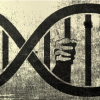In my opinion, faith is defined as a set of internalized beliefs which one can base their emotion on. Religion is a social construct orienting people's emotions and people's sense of reality under supernatural entities, inviolable principles for mankind, and by collusion, the sanctity of people, things, and concepts on earth based on their interaction with these supernatural entities.
Faith, the basis for religion, is subjected to the power of suggestion. Debating the existence of God, for example, assumes the existance of God, and draws people to fight for whichever belief is the most emotionally satisfying and in touch with their own lives. If any religious person made it a habit to stand in the mirror everyday, confridently and loudly affirming to themselves "God doesn't exist" and "the Bible is a lie", chose to only read articles that provided rational evidence for the nonexistence of God, and desecrating sacred objects such as the Bible, they will eventually reject their faith because simply suggesting that God doesn't exist on a level that is credible and a level and targets emotional factors within themselves that cause them to reject God.
The opposite is also true. If someone who is athiest prays to God everyday, goes to chruch for guidance, listens to christian music, and visually, auditorially, and kienestically subject themselves their that faith, his emotions will reorient themselves to join the faith. Using common mediums of exchange to communicate these ideas and create a consistent framework around one's mind creates a new faith.
Ultimately, people should embrace in whatever benefits them. Religious institution today is outdated, with main faiths such as Christianity, Islam, and Hinduism unwilling to bow to the changes of modern day socities (there are exceptions, depending what aspects). People's beliefs in these instutions are conflicting with personal decisions such as whether to have an abortion, whether to have premarital sex, among hundreds of other things. Faith needs to continuously evolve to better suit humanity. It needs to quickly react to better deal with changes to modern society. People need to orient their emotions to better suit their lives. Here are 3 tenets that we should use to guide our beliefs and emotions:
1) Acceptance of Science as Truth: Science, proven through comprehensive testing and skepticism, is fact. We can only accept new truths if they should have been proven. Collaborative, unbiased attempts must be made to further discover the "truth".
2) Faith in personally defined values and beliefs-Without faith humanity would crumble because it fundamentally decides how society is oriented. Current faiths that have developed such as Christianity, Islam, Buddhism, and Hinduism were socially important to advancing society given their cultural context. But with the advent of democracy, the scientific revolution, and free-market capitalism, gaping flaws to these faiths has been uncovered and society is continuing to evolve to adapt to these changes in social structure. One must create values and beliefs by themselves, corroberate with others to spread their ideas, and continually adapt their own ideas and other's ideas to better serve practical causes.
3) Dynamic Optimism- People should be intensely spiritual about their personally defined values and beliefs. Wholehearted embrace of these values, clearly defining them, and tying them to their own lives on a systematical, flexible basis is necessary for self-fulfillment. The effect these beliefs have on oneself's personally, on others, and on the future of humanity in general must be taken into account. One's faith can continually change but always remains credible because it is best suited to deal with the realities of one's life. With beliefs that are designed to positively affect the world and constantly reassesed and optimized, civilization can continue achieving its peak potential.
The futures of civilization will not be a clash of civilizations or religions or political ideologies, but a clash of different values. Do we want our policies to reflect freedom or security? Charity or greed? Indulgence in desires or abstinence? But keeping human interest in mind, social evolution will always end up in a way favoring the side that benefits society more. Increased evolution of technology and ideas in the future will make us all better off.









































